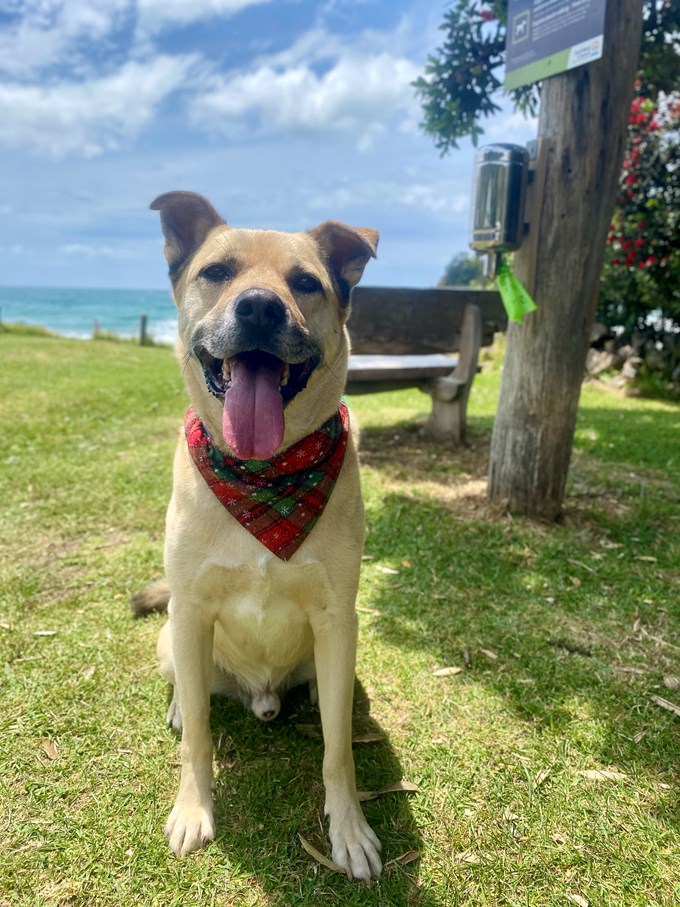A Waiheke Island resident aims to kick single-use conventional plastics out of the ecosystem by producing home-compostable dog poo bags.
Little Green Dog founder Todd O’Hara says he wanted dog owners to have a truly green alternative to the conventional high-density polyethylene (HDPE) plastic bags.
“Most dog bags contain harmful plastics and chemicals, but our natural, plant-derived alternative is made from fully biodegradable, certified 100-per-cent home-compostable materials,” he says.
“They enable dog owners to go from zero thought to zero waste by being able to take control of their own waste cycle.”
Auckland Council’s Amenities and Infrastructure Maintenance (AIM) Service provider is working with Little Green Dog on Waiheke.
“We’re excited to be leading from the front with this global challenge and providing these new bags to local dog owners,” AIM’s Waste Waiheke Foreman Anne Pryor says.
“It signifies how serious we are about making a difference.”

Anne says switching from non-biodegradable to compostable plastics while supporting a local company was a “win-win”.
Todd says the bags can be composted at home using a dedicated composting system.
“It’s best to set up a separate composting system dedicated for the poop bags and ensure the output of the composting system is only used on non-edible crops like flowers.”
Todd says he founded Little Green Dog in 2019 after he started looking into the biodegradable plastic bags he was buying.
“I realised that almost all of them are made from HDPE plastic with an added degradable agent, which breaks down in a few months and leaves behind millions of microplastics that land themselves in waterways and the environment.
“While it’s easier and cheaper to produce bags that meet the lower biodegradable standard, we wanted to take pride in doing the right thing. When we look at how we treat the Earth, it’s what’s right that matters. Not what’s easy.”
The bags are now available for use at 13 locations, including beaches and parks, on Waiheke Island.
For more information on the bags and visit littlegreendog.co.nz
What are Little Green Dog bags made from?
Most dog bags contain polyethylene, but Little Green Dog’s alternative is made from PLA, PBAT, and glycerin. That’s it: a fully biodegradable, 100 per cent home-compostable material.
Are these home compostable, or just commercially compostable? What's the difference?
Little Green Dog is one of the first New Zealand companies to produce certified home-compostable poop bags.
Being home compost-certified is a much more difficult status to attain, as the product has to break down in a more natural backyard compost setting.
Home-compostable products are generally made from thinner materials, usually require somewhere around 20°C to 30°C to break down, and they’re given a longer time period to do so (usually 90 per cent degradation in 365 days).
What certification do you have for these bags?
Little Green Dog holds the Seedling certification under EN13432 for general compostability, registration number 7P2277 and TUV Home Compost certification S1069.
How should people dispose of them?
Composting your pet’s poop bags at home is a great way to independently close the waste loop. The best option is to keep a second compost bin at home which is separate from your main compost and is only applied to non-edible crops like flower gardens etc.
What happens if they do end up in a landfill?
It’s not the best, but it’s better than plastic or ‘eco plastic’ in there. Little Green Dog’s material is capable of mesophilic digestion by anaerobic bacteria like the kinds found in non-compacted landfills. During that breakdown process there it is fully breaking down rather than the alternative of plastics or even ‘eco plastics’ which usually break apart into microplastics.


